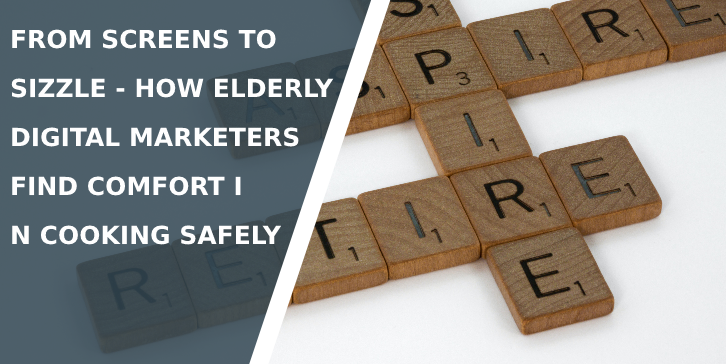In a rapidly evolving digital landscape, it’s not uncommon to find seasoned professionals in their golden years who continue to contribute their expertise to the dynamic field of digital marketing.

While their experience and knowledge are invaluable, the constant exposure to screens and digital devices can take a toll on their well-being. To detox from the digital realm and find respite, cooking serves as a wonderful and therapeutic outlet.
Engaging in the culinary arts allows these elderly digital marketers to immerse themselves in a sensory experience that is far removed from the virtual world. The act of chopping, stirring, and tasting brings tactile joy and gratification that reconnects them to the pleasures of the physical realm.
Moreover, experimenting with flavours and creating delicious dishes fosters a sense of accomplishment and creativity, rekindling a passion for innovation that transcends the boundaries of digital marketing.
Cooking not only offers a delicious escape but also provides an opportunity to savor moments of mindfulness and share the fruits of their labor with loved ones, enriching their lives both in and out of the digital realm.
Cooking is an art that transcends generations, and it’s no different for our elderly population. Many seniors take great joy and pride in preparing meals for themselves, and this blog post aims to inspire and support them in their culinary endeavours.
As we age, our nutritional needs and preferences might change, but that doesn’t mean we have to compromise on the pleasure of cooking and enjoying delicious homemade meals.
This blog post will provide valuable insights, tips, and easy-to-follow recipes to empower elderly individuals to continue cooking for themselves with grace and wisdom.
Organise the Kitchen
Keep the kitchen well-organised and clutter-free. Ensure frequently used items like pots, pans, and utensils are easily accessible without the need to reach for high shelves or bend down too low. Use labelled containers for spices and ingredients to avoid confusion.
Good Lighting: Ensure the kitchen is well-lit, with bright lighting over the cooking area and countertops. Adequate lighting helps prevent accidents, such as misreading labels or confusing salt for sugar.
Fire Safety: Install a fire extinguisher and ensure elderly cooks know how to use it in case of small fires. Avoid wearing loose-fitting sleeves while cooking, and keep flammable items away from the stove.
Stable Work Surfaces: Ensure all work surfaces, such as countertops and cutting boards, are stable and secure. Avoid using wobbly or slippery cutting boards that may lead to cuts or slips while chopping.
Safe Flooring: Use non-slip flooring in the kitchen to prevent accidental slips, especially if there is a risk of spills. Secure loose rugs or mats to avoid tripping hazards.
Safe Handling of Knives: Teach proper techniques such as the “claw grip” to avoid cuts. Consider using knives with ergonomic handles that provide a better grip.
Avoid Loose Clothing: Encourage elderly cooks to wear fitted clothing while cooking to avoid catching loose sleeves or clothing on stove burners or handles.
Monitoring Cooking Appliances: Advise using appliances with built-in timers or setting reminders to prevent food from burning or overcooking.
Hot Surface Awareness: Place brightly coloured, heat-resistant tape on hot surfaces like stovetop knobs to help elderly cooks easily identify potential hazards.
Invest in Proper Kitchen Aids: Consider using kitchen aids such as reachers, jar openers, and adaptive utensils to make tasks easier and reduce strain on joints.
Proper Lifting Techniques: Demonstrate and encourage proper lifting techniques to avoid strain or injury when handling heavy pots and pans.
Temperature Awareness: Teach elderly cooks to test food temperature before consumption to avoid burns from hot dishes.
Safe Electrical Appliances Usage: Check the condition of electrical appliances regularly, and avoid using frayed cords or malfunctioning devices. Encourage unplugging appliances when not in use.
Handling Hot Items: Use oven mitts or pot holders to protect hands from burns when handling hot cookware or dishes.
Prevent Cross-Contamination: Stress the importance of proper food handling and storage to prevent cross-contamination and foodborne illnesses.
- Simplified Meal Planning
Guide elderly cooks on planning their meals efficiently, considering nutritional requirements, balanced diet, and portion control. Offer simple meal planning templates and suggestions for weekly meal preparation.
Time-Saving Cooking Techniques
Introduce time-saving cooking techniques that are perfect for elderly home cooks. These include one-pot recipes, slow cooker meals, and batch cooking ideas to reduce kitchen time and effort.
Embracing Local and Seasonal Produce
Encourage seniors to explore their local farmer’s market and embrace seasonal produce. Discuss the nutritional benefits of fresh, local ingredients and offer recipe ideas to incorporate them into everyday cooking.
Adapted Recipes for Dietary Needs
Provide adapted recipes that cater to various dietary needs, such as heart-healthy, diabetic-friendly, low-sodium, and soft-textured options. Ensure these recipes are still packed with flavour and enjoyment.
Rediscovering Family Recipes
Urge elderly cooks to revisit and revive old family recipes, tapping into cherished culinary memories and traditions. Offer suggestions on how to adapt these recipes to meet current dietary requirements.
Virtual Cooking Communities

Explore the idea of virtual cooking communities or cooking classes designed specifically for seniors, where they can share experiences, tips, and recipes while fostering a sense of camaraderie.
Kitchen Organization for Ease
Guide organising the kitchen for optimal convenience, such as using labelled containers, creating accessible storage spaces, and keeping cooking utensils within reach.
The Joy of Sharing
Discuss the joy of sharing meals with loved ones and offer ideas for hosting simple gatherings, potlucks, or dinner parties. Emphasise the social and emotional benefits of cooking for others.
Conclusion
Cooking is a timeless passion that can be relished throughout life. By catering to the unique needs and interests of elderly home cooks, we can empower them to continue their culinary journey with confidence, grace, and wisdom.
Whether for health reasons, nostalgic tastes, or the joy of sharing, the kitchen can remain a place of inspiration and creativity for seniors, making each meal a delightful experience.
Ryan is a professional copywriter from Ryan’s Copywriting. He has a passion for writing and sharing information.





Comments are closed.